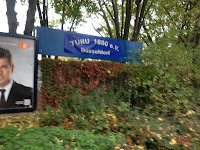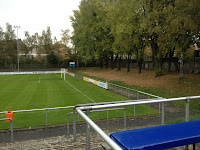TuRU Düsseldorf, or Turn-und Rasensport Union Düsseldorf to give them their full title are a football club from Dusseldorf in the north west of Germany. The club were formed in 1919, after several other clubs were absorbed over the years.

Borussia Düsseldorf merged with Vorwärts Düsseldorf to create Düsseldorf Fußball Klub Union in 1909, who then went on to reach the advanced stages of the national finals in 1913. The club merged further with Verein für Rasensport Düsseldorf (once known as Sport Club Athen Düsseldorf) and Friedrichstädter Turnverein 1880 in 1919 to create TuRU.
The new club reached the final of the Westdeutcher Fußball Verband in 1923 and then the last eight of the national finals before being defeated by Hertha BSC Berlin. From 1935 to 1942 TuRU played in Gauliga Niederrhein, one of sixteen premier divisions across Germany. After World War Two, the club became members of Oberliga-West after moving from their Oberbilker Allee home and then in Oberliga Niederrhein from their new Stadion an der Feuerbachstraße.

Partly through re-organisation and poor performances, TuRU found themselves competing in the Lower Rhine Landesliga from 2008. Fortunately form improved with Die Tauben (The Doves) joining Oberliga Niederrhein once more in 2012.
TuRU Düsseldorf will play in Oberliga Niederrhein for the 2013-14 season.

My visit
Friday 26th October 2012
I was in Germany for the opening day of four, eager to visit as many new venues as possible around seeing four matches and enjoying the social scene to the full while getting as much value as possible from my day rail ticket. I had been to three grounds in Cologne and arrived in Dusseldorf eager to visit the after going past it a few times on my previous visit to the city.
I managed to work out the SBahn system, which would work to my advantage on several occasions over the next couple of days and take a train from the Hauptbanhof to Volksgarten station, from where the ground could be seen from the platform. I dropped down to street level and found the entrance to the ground open just off Am Hennekamp. Three youngsters went inside first and headed to the artificial pitch behind the clubhouse, while I entered the main ground.
It really was a lovely old fashioned venue, which reminded me of some of the older non league grounds back home in England. A long benched seated stand ran down one side with a little bit of open terracing at either side, with the other three sides consisting of open grass banks and hard standing at the bottom. Trees topped the banking giving the ground an enclosed feel. An open bar area stood by the turnstiles.
I left as the youngsters played out their game, thinking how nice it was to see them allowed to play at such a facility. The Ringelsweide pathway led me to Oberbilke Alee, which gave me the opportunity to go underneath another branch of the SBahn and along Gustav-Poensgen Strasse to my budget accommodation at Hotel Schaum, fully complete with a view down to the platforms of the Friedrichstadt station.
I thought the Stadion an der Feuerbachstraße to be a super ground and I hoped to re-visit for a game at some point in the future.








No comments:
Post a Comment